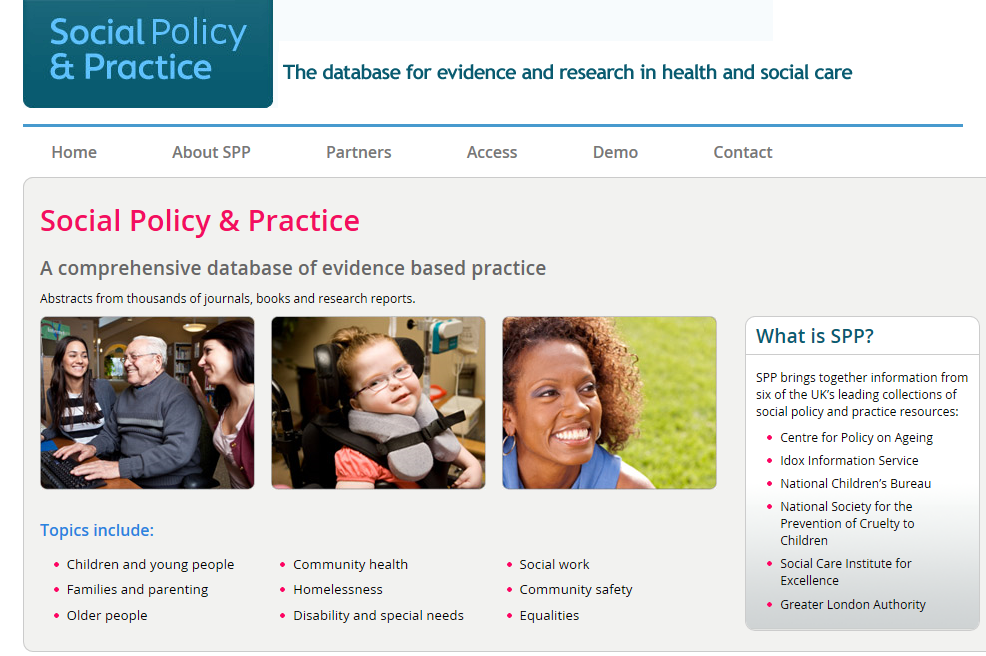
Social Policy and Practice is the UK’s only national social science database embracing social care, social services, public health, social policy and public policy. And Ovid – the internationally-recognised leader in medical information services – is celebrating its unique benefits by offering the chance for librarians and researchers to test drive it for free, throughout October!
UK-focused evidence and research
Social Policy and Practice is produced by a consortium of key organisations within the UK. Currently these are:
- Centre for Policy on Ageing
- Idox Information Service
- National Children’s Bureau
- National Society for the Prevention of Cruelty to Children
- Social Care Institute for Excellence
The focus is on research and evidence that is relevant to those in the UK. So although a large proportion of material relates to delivery and policy within the UK and the devolved nations of Scotland, Wales and Northern Ireland, the database also covers material that is transferable from Europe and across the world.
Unrivalled scope
Social Policy and Practice covers all aspects of public health and social care. It is a must-have resource for anyone interested in the following topic areas:
- Social work and social care services
- Children and young people
- Adults and older people
- Families and parenting
- Safeguarding
- Health promotion
- Health inequalities
- Community development
- Physical and mental health
- Education and special educational needs
It also offers a holistic view of wider policy areas that impact on health, such as homelessness, housing and deprivation.
Social Policy and Practice boasts over 400,000 references to papers, books and reports and about 30% of the total content is grey literature.
The importance of geographical focus
Research studies have shown that people searching for social science evidence tend to neglect the question of geographical and coverage bias within research sources. And that the geographical focus of databases is a potential source of bias on the findings of a research review.
In the last ten years many UK-produced databases have ceased – funding has stopped, publishers have closed or databases have been taken over by international publishers (which reduces the balance of UK content).
So as a UK-produced database, Social Policy and Practice is uniquely placed to provide relevant results for UK-based researchers.
A valued resource
Social Policy and Practice has been identified by the National Institute for Health and Care Excellence (NICE) as a key resource for those involved in research into health and social care. And importantly, it supports the ability to take a holistic approach to improving outcomes, by covering social issues such as poor housing, regeneration, active ageing, resilience and capacity building.
Social Policy and Practice was also identified by the Alliance for Useful Evidence in a major mapping exercise in 2015, as a key resource supporting evidence use in government and the public sector.
To see for yourself why so many UK universities and NHS bodies rely on Social Policy and Practice as a resource, visit Ovid Resource of the Month for instant access.
To find out more about the history of the database and the consortium of publishers behind it, read this article from 2016 which we have been given permission to share.
Share
Related Posts
By Donna Gardiner While free school meals (FSM) have been available in England on a means-tested basis since 1944, recent years have seen a renewed focus upon the potential benefits of providing free school meals to all school-aged children. Currently, ....
Today sees the start of Community Garden Week 2023. Across the UK, communities will be celebrating the many and varied types of community gardens, from children’s and neighbourhood gardens to therapy gardens and allotments. The benefits of community gardens are ....
By Hollie Wilson At the start of 2020, an independent review was published setting out what needed to be done to bring about changes to the care system for children and young people in Scotland. At the heart of the ....
The “No Wrong Door” (NWD) programme means exactly that – there is no wrong door to turn to for young people seeking support. NWD works on several core principles, which include working with young people’s birth family or guardians, allowing ....
